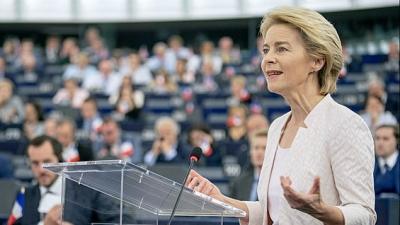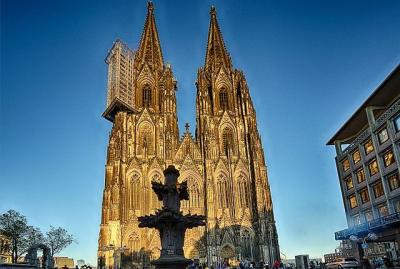Rügen is a place of romantic longing for many Germans. Today, the largest island in the republic has primarily the reputation of a tourist resort, seaside place and nature reserve. And one artistic vision of it remains especially vivid in the German soul: a romantic painting by Caspar David Friedrich, the chalk cliffs in which have etched themselves into our memory. The observer rests in a quiet contemplation of the moment; the heights gaze into the depths; the eye wanders longingly into the distance. Friedrich was born in Greifswald, which, like Rügen, lies in Western Pomerania. The romantic poet and freedom fighter Ernst Moritz Arndt was born on Rügen itself.
One of the greatest errors in German political and intellectual history is to call the Greens “romantics”. For the German Greens have virtually nothing in common with historical romanticism. The Greens are highly political and want to carry politics into the most private corner; the German Romantics, on the other hand, evaded politics almost completely. Heinrich Heine's reproach was not that they cared too much about politics, but rather too little. He lamented construction of the Cologne Cathedral in the 19th century because it merely looked back into the past and situated Germany's position in the world in the Christian Middle Ages, not in the present.
The “green” political camp, on the other hand, does not want to look back to the past. Everything in the past is deeply repugnant to them. The belief of being able to save the world's climate by planting as many wind turbines as possible may be naive in its core, but it is certainly not romantic. It is profoundly technicist and linked to the Enlightenment idea of progress that believes it has a solution to every question. The origin of European totalitarianism is not to be found in romanticism, but in an attitude that thinks in terms of masses and numbers. Those who believe they can calculate climate change down to the decimal point and solve it with the help of a grand plan belong to a completely different school of thought than the romantics.
The “green”, ecologist spirit is technicist to a significant degree and thus basically directed against the environment, against the human essence, against tradition and against the spirit. Utopia does not mean transfiguration but a goal to be achieved step by step: this is what German federal politics is currently making clearer than ever before. For Federal Economics Minister Robert Habeck, who embodies the spirit of his party in almost all respects like no other, wants to build an LNG terminal right near Rügen. Near a nature reserve. Near a tourist resort. Without any consideration for the local people. Right into the heart of the German romantic soul.
The “green” dream does not consist of tranquil villages with organic farming. It consists of solar panels that smother all greenery. It consists of seascapes and hilly landscapes dotted with wind turbines, which disfigure all the beauty between the Rhine and the Elbe sung about by the German Romantics. The “green” spirit is not ridding the inner city of cars in order to create avenues for cafés and bookshops; it wants to replace the cars with racing cycle tracks through which cyclists rush just as the car drivers did before. Leisurely strolling is as alien to the greens as any sense of aesthetics that does not go beyond kindergarten dreams. One should not confuse romanticism with childish naivety.
How could it have come to this? The answer as to why a quintessentially “green” politician such as Habeck wants to build an industrial harbour in Sellin on the island of Rügen - only a few kilometres from a biosphere reserve and one of Germany's most beautiful sandy beaches - is multi-faceted. The reason is the Ukraine war and the related gas crisis. The cause, on the other hand, is the energy transition. What a joke: Germany got out of nuclear power and wanted "green energies". Now nature has to take the blame.
Part of this story is that Habeck recently travelled to Brazil in order to protect the rainforest and explain to the indigenous people that the Germans had “cut down their primeval forest 1,000 years ago”. In reality, one of the last pieces of primeval forest in Germany, the fairy tale Reinhardswald of the Brothers Grimm - another piece of German romanticism - is soon to be handed over for destruction: Although it is a nature reserve, wind turbines are to be built there. Green energy instead of green forests.
The cause of this tragedy: the supposed saviours - renewable energies – do not deliver what they promise. Without storage, the electricity suddenly fizzles out - and has to be passed on to the neighbouring European countries when Germany produces too much. When the wind is down and the weather is bad, Germany in turn has to rely on imports. Gas is therefore needed to maintain a base load in the German electricity grid. Because Germany wants to use the gas infrastructure to switch to "green" hydrogen one fine day. When will that moment arrive? The answer can perhaps be found in Grimm's fairy tales.
Yet it would be wrong to think that this is related to naive romanticism after all. Because the energy transition is a business. Politicians (across all parties), associations, NGOs and enterprises all earn money from it. There may be visionaries who really believe in this idea. But the powerful rarely believe in visions. It depends on money whether this project can be implemented. A lot of money is flowing from the state. Lobbyists who used to advocate nuclear power now reappear as advocates of wind and solar power. This is not romantic either. It is hard business.
The ones who suffer are the taxpayers in general, and the people of Rügen today in particular. Another note belongs to the mosaic of this putrid, sulphur-consumed path followed by the green poison. After several weeks, the "Last Generation" has once again carried out an attack. The extra-parliamentary arm of the “Greens” attacked a painting by Caspar David Friedrich in the Hamburg Kunsthalle. It is one of the painter's most famous paintings: "The Wanderer over the Sea of Fog". The museum management reacted with a shrug. Perhaps they were even in on it. For the “green” spirit is not the fulfiller, but the gravedigger of German Romanticism.
Read also
The Question of Oriental Christians is a European Question
Europe will be Christian again, or it will no longer be at all. How Christian it truly is, is also shown by how much it stands by its fellow Christians. In the case of Christianity in the Orient, the very region of origin of the religion that had made Europe what it was and what it is now - things look bleak.
Marco Gallina
The Leyen Question
How firmly is EU Commission President Ursula von der Leyen in the saddle? If one follows official accounts, then everything speaks in favour of the German seeking a second term in office and having broad support for it.
Marco Gallina
Journalists on state payroll
For example, the federal government has spent almost 1.5 million euros on commissions to journalists over the last five years – whereby a significantly higher part was spent on public service journalists.
Marco Gallina
The Catholic Church in Germany is in a worse situation than in 1517
The Archbishop of Cologne is one of the most important representatives of the Catholic clergy not only in Germany, but worldwide.














Comments (0)